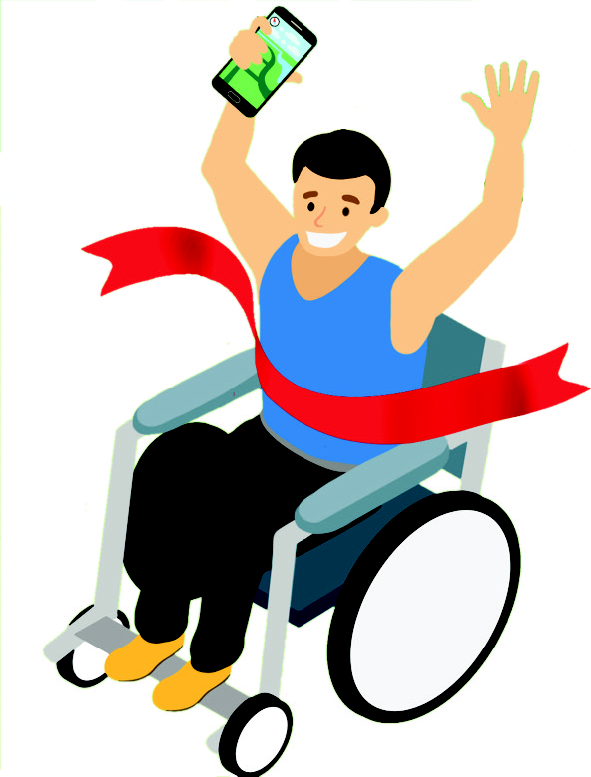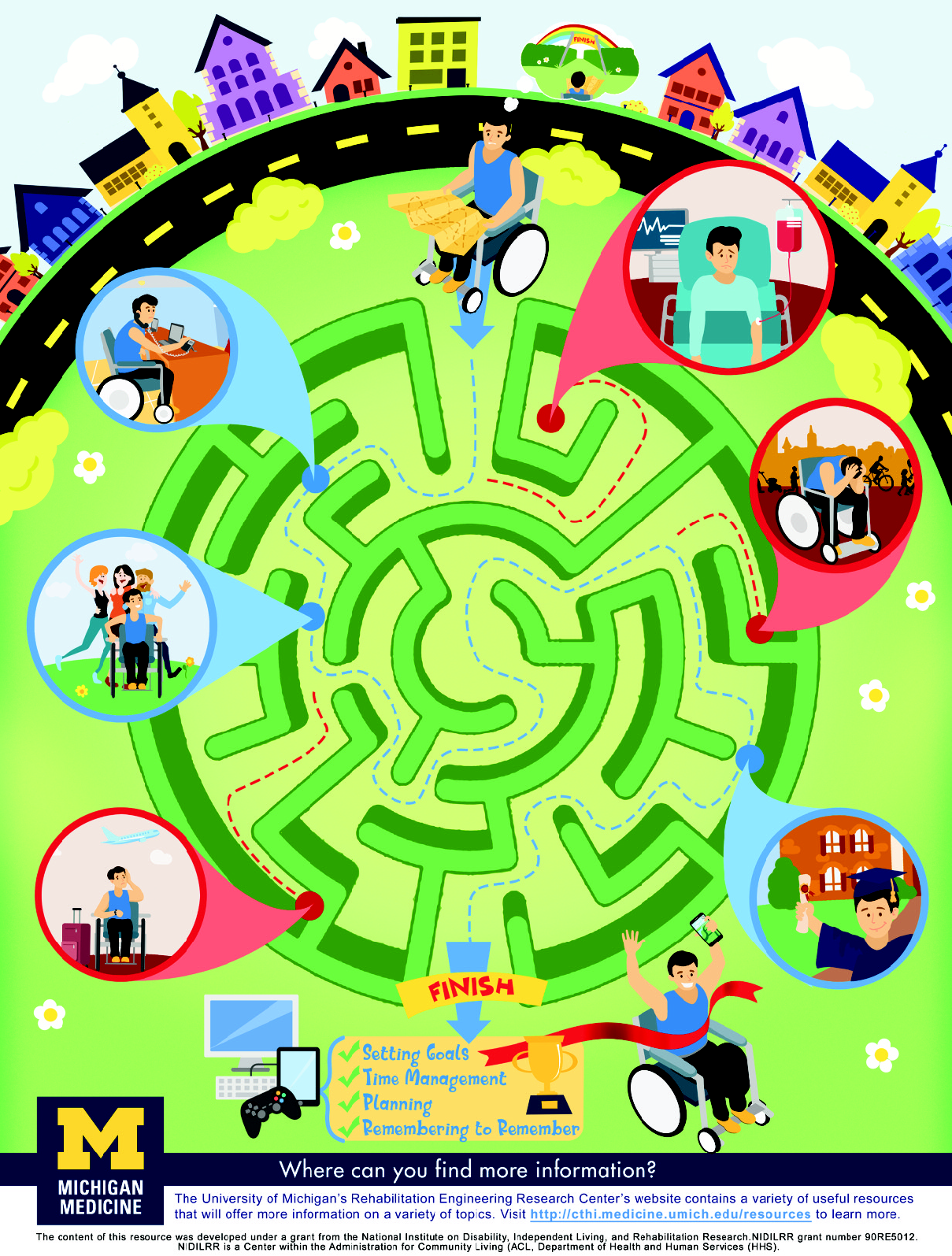FACE OF CHALLENGE MOTIVATION, SKILLS & TRANSITION HEALTH SELF-MANAGEMENT
BY DONNA RICCIO OMICHINSKI, BA, CCRP, SETH WARSCHAUSKY, PHD AND ABIGAIL SIMONE, BS, MS

A team of researchers at the University of Michigan is studying how adolescents and young adults with neurodevelopmental and chronic health conditions learn to self-manage their health and medical needs. By evaluating motivation and specific skills in a group of adolescents and young adults with cerebral palsy and spina bifida, researchers found they could predict ability to self-manage health. To complement health self-management training, mobile technologies can be used as tools to support decision-making and enhance motivation.
This article introduces two important factors affecting the ability of young adults with chronic conditions or disabilities take care of their own health needs – referred to as health self-management. Health self-management is critical in the transition process for young people to achieve optimal levels of independence. For those struggling with health self-management, technology can be used as a tool to promote motivation, support independent planning, decision-making and task completion. Important factors for health self-management:
• Mastery motivation (MM): The ability to persist in the face of challenge, staying motivated to achieve a task • Executive functions (EF): The ability to plan and organize, manage time, set goals, and "remember to remember"
During the transition to adulthood, it is expected that young people learn to manage their health needs, such as scheduling doctor appointments, filling prescriptions, and eventually the complexities of healthcare insurance. However, the transition to health self-management can be more complex for young people with chronic medical conditions and disabilities. For example, the ability to perform tasks requiring strength and dexterity like lifting and carrying medical equipment, or opening a bottle of medicine, can be very challenging. Even day-to-day self-care such as showering or brushing teeth can be difficult. Understandably, these young people are at risk for lower mastery motivation, and thus have difficulty learning new skills.
Difficulties with EF make learning new skills and staying motivated even more complex for many young people with chronic medical conditions. EFs are important for developing the ability to plan activities, organize homework and "remember to remember" medications. These challenges and needs can become an overwhelming maze of responsibilities. Young adults with other types of neurodevelopmental conditions such as autism spectrum disorder or attention deficit hyperactivity disorder also experience dificulty managing these routine health needs and lifeskills.
Consequences of not being able to maintain and manage one's health and medical needs can result in chronic illness or even hospitalization. Independent health self-management becomes especially important when we think about how it will affect other areas:
1. Taking care of yourself at school or in college 2.Working and seeking gainful employment 3. Being active with friends and taking part in community activities 4. Living with optimal independence
Resources such as Got Transition (gottransition.org/about/index.cfm) can be a valuable resource for families and medical providers. Information such as self-care assessments, learning how to make a medical appointment, keeping track of medical history, questions to ask during visits to the doctor and more are provided. Recognizing that "self-care" for health and medical needs is a learning process and should be viewed as a key for successful transition to becoming an optimally independent young adult.
IEP, TRANSITION PLANNING AND ASSISTIVE TECHNOLOGY
Typically, young people with chronic medical or developmental conditions receive special education services while attending a public school (K-12) through an Individualized Education Plan (IEP) (understood.org/en/school - learning/special services/ieps/what-is-an-iep) Ideally, the goals and objectives of the IEP should be designed to prepare the student at each phase of their education (including post-high school), plan for gainful employment, and achieve optimal independent living. The transition plan is a component of the IEP that the team should begin addressing no later than age 16. Using the transition plan, the IEP team should begin to shift the student's goals and objectives from school life toward "functional" adult life.
A solid transition plan can support the concept of self-determination, self-advocacy, and foster independence aimed at health and medical self-management. Circling back to the notion that health selfmanagement is a critical part of the transition to optimal levels of independence, one can see how the IEP can be used as a tool to help the young person learn to manage their own medical and health needs by setting measurable goals and outcomes. These goals can be supported through instruction and training in how to take a strategic approach to health-related needs and mobile technology. The utilization of mobile assistive technology can be written into the IEP as a way to address difficulties with EF and MM. With technology such as smart phones, wearable fitness trackers/watches, or even gaming, the student can receive programed prompts, implement smart scheduling aids and get immediate feedback on self-identified goals. However, the ultimate motivation could potentially be derived from enhanced socialization and social activities (see Table 1, next page). A comprehensive list of transition resources can be found on the Learning Disabilities Association of America website (ldaamerica.org/transitionplanning-requirements-of-idea-2004/).
Health self-management is an integral skill necessary for young adult with disabilities to possess in order to become optimally independent. MM and EF are skills that tend to be lower for this population. IEPs and proper transition planning can be the key to assisting young people in the move from school to adult life. Mobile technologies are tools that can support and develop MM and EF which, in turn, support health self-management, independence and health-related quality of life. Further information on health-self management, transition planning and mobile technology: The University of Michigan's Rehabilitation Engineering Research Center website at

cthi.medicine.umich.edu/resources • Acknowledgements: Funding from the U.S. Department of Health and Human Services, Administration for Community Living, National Institute on Disability, Independent Living, and Rehabilitation Research grant 90RE6012, and the Mildred Swanson Foundation. The contents of this article do not necessarily represent the policy of NIDILRR, ACL, HHS, and you should not assume endorsement by the Federal Government.
ABOUT THE AUTHORS: Donna Riccio Omichinski, BA, CCRP – Ms. Omichinski is a research project coordinator with the Department of Physical Medicine and Rehabilitation at the University of Michigan where she is involved in research focused on neurodevelopmental conditions. She has authored parent and educator articles for Exceptional Parent and the Journal of the American Academy of Special Education Professionals. Ms. Omichinski is the parent of a young adult with developmental disability. Seth Warschausky, PhD – Dr. Warschausky is a professor and pediatric neuropsychologist at the University of Michigan. He is Director of the Children's Neurodevelopmental Assessment Core and the Founding Director of the Michigan Adapted Cognitive Assessment Laboratory. Abigail Simone, BS, MS – Ms. Simone is a research assistant for the Department of Physical Medicine and Rehabilitation at the University of Michigan. She has used her background in kinesiology and molecular and integrative physiology to work as a personal trainer and caregiver to young adults with neurodevelopmental disabilities.
References 1. "Guide to the Individualized Education Program." Home. March 23, 2007. www2.ed.gov/par- ents/needs/speced/iepguide/index.html. 2. Lee, Andrew, JD. "IEP Transition Planning: Preparing for Young Adulthood." Understood. understood.org/en/school-learning/special-services/ieps/iep-transition-planning-preparing-for- young-adulthood. 3. Reiss, J., and R. Gibson. "Health Care Transition: Destinations Unknown." Pediatrics 110, no. 3 (December 2002): 1307-314. 4. Resources. University of Michigan Rehabilitation Engineering Research Center. cthi.medicine.umich.edu/resources. 5. SCI Hard. University of Michigan Rehabilitation Engineering Research Center. cthi.medicine.umich.edu/projects/tiktoc-rerc/research-development-projects/r2. 6. Team Understood. "Learning About IEPs." Understood.org. understood.org/en/school- learning/special-services/ieps/what-is-an-iep. The SCI Hard app is available for download on the Apple iTunes store and Google Play. Use code 1704. 7. "Transition Planning Requirements of IDEA 2004." Learning Disabilities Association of America. March 10, 2015. ldaamerica.org/transition-planning-requirements-of-idea-2004. 8. "What Is Health Care Transition?" Got Transition.